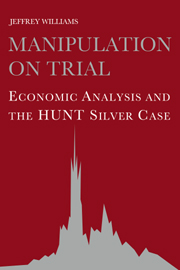Book contents
- Frontmatter
- Contents
- List of figures
- List of tables
- Preface
- Foreword by Thomas O. Gorman
- 1 Why the Hunt silver case?
- 2 Turmoil in the silver market
- 3 Identifying a manipulation
- 4 Testing for the cause of the price rise in silver
- 5 Determining the appropriate price of silver
- 6 Inferring manipulative intent
- 7 The predicament of economic analysis in the courtroom
- Glossary of commodity market terms
- References
- Index
5 - Determining the appropriate price of silver
Published online by Cambridge University Press: 17 September 2009
- Frontmatter
- Contents
- List of figures
- List of tables
- Preface
- Foreword by Thomas O. Gorman
- 1 Why the Hunt silver case?
- 2 Turmoil in the silver market
- 3 Identifying a manipulation
- 4 Testing for the cause of the price rise in silver
- 5 Determining the appropriate price of silver
- 6 Inferring manipulative intent
- 7 The predicament of economic analysis in the courtroom
- Glossary of commodity market terms
- References
- Index
Summary
Determining the appropriate price of a good is the main activity of experts in many fields, for example, those appraising privately held firms for tax purposes, those appraising houses for mortgages, or those appraising fine art for auction reserves. Often such experts testify in court. At the Hunt trial, the economist expert witnesses all expressed opinions about what the price of silver would have been without the Hunts' trading. Because the appropriate – the “competitive” – price of silver directly determined damages, the experts were asked to name a specific dollar value per troy ounce. As typical in trials distinguishing liability from damages, their appraisal was considered a distinct issue, separate from their other opinions about the silver market and the way it functioned.
In naming the “competitive” price for silver, the experts at the Hunt trial disagreed by several hundred percent. At one end of the spectrum, Professor Houthakker pronounced the price without the Hunts' trading to be $8 to $10 per troy ounce, up slightly from the $6 prevailing in January 1979. At the other end of the spectrum, Professor Edwards, the defense expert who testified most directly on this issue, proposed something like $45 per troy ounce, just slightly below the peak price of $50 reached in January 1980.
- Type
- Chapter
- Information
- Manipulation on TrialEconomic Analysis and the Hunt Silver Case, pp. 135 - 160Publisher: Cambridge University PressPrint publication year: 1995



